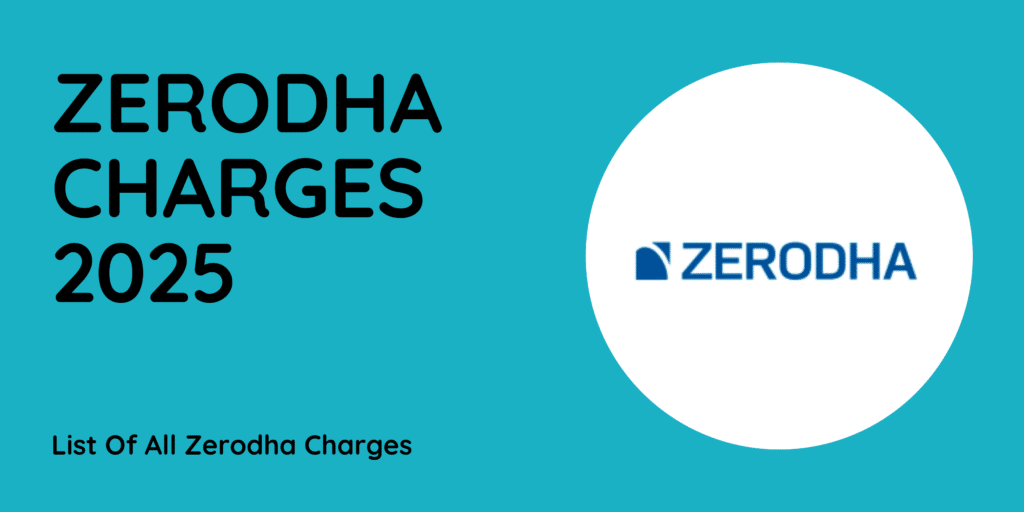

Zerodha Charges 2025: Investing with Zerodha has become a remarkable choice for traders and investors. They have a reputation for low brokerage and transparency in fees. Zerodha charges are clearly structured and easy to understand. The nominal fees for opening trading and demat accounts as well as various account types make it accessible to many.
In this article, we will take a look at Zerodha account opening charges, brokerage charges, and AMC while navigating Zerodha charges 2025. Additionally, if Zerodha carries some other charges, let’s explore that too.
When considering opening an account with Zerodha, it is important to understand the various charges involved in it. A detailed breakdown of Zerodha account opening charges is given here.
Type of account | Trading And Demat |
Online account | Free |
Offline account | Free |
Demat AMC | Rs 300 + GST |
Zerodh account opening is now free for those below 25 years of age. Click to open account instantly with Zerodha.
Type Of Account | Only Equity, F&O and Currency | With Commodity |
NRI Account (offline only) | Rs 500 | N/A |
Partnership, LLP, HUF, or Corporate Accounts (offline only) | Rs 500 | Rs 800 |
By knowing these charges, you can take a better decision about account opening in Zerodha.
Note that there is no fee for opening only trading account in Zerodha. Also Zerodha has waived off the account opening charges for the clients under 25 years of age. But the combined costs for trading, demat and commodity accounts can vary depending on how you open your account.
Zerodha’s AMC and other related charges need to be examined. Because, these costs can affect your investment strategy. Here is a detailed overview of these charges:
Type of Zerodha Account | Annual Charges | Quarterly Charges |
Individual, HUF, and partnership firms | ₹300 + 18% GST | ₹75 + 18% GST |
NRI Account | ₹500 + 18% GST | ₹125 + 18% GST |
Corporates, i.e. LLPs and private & public companies | ₹1000 + 18% GST | ₹250 + 18% GST |
AMC Billing Cycle:
Understanding Zerodha brokerage charges is essential for traders and investors to make informed decisions. The Zerodha brokerage structure is straightforward, but it varies depending on the type of trading or investing. Here is an in-depth look at the various brokerage fees associated with trading on Zerodha’s platform:
In addition to the standard brokerage and account charges, Zerodha levies certain additional charges that are important for investors to be aware of. These charges can impact the overall cost of trading and investing, so let’s break them down:
In our exploration of Zerodha charges, it’s important to consider the various other fees that could affect your trading costs. Let’s dive into some of these additional charges.
This article examines Zerodha’s fee structure in detail. It covers all charges from account opening fees to AMC details, brokerage charges and various other related charges. This helps in creating a clear investment strategy while investing with Zerodha and increases the potential for financial success.
Appreciating transparent pricing and additional value added services, one can invest with Zerodha with greater confidence and accuracy. If you are facing high charges with another broker then you can definitely consider Zerodha. Also for those who are just starting their trading journey, now is the time to act. Start your journey today and open an account with Zerodha.
No brokerage charges are charged for Zerodha Equity Delivery trading. However, for intraday trade, Zerodha charges Rs.20 per order whether it is for buy or sell orders.
The cost of opening a trading account with Zerodha is Rs 200, while opening a Demat account is free of charge. Zerodha also charges an Annual Maintenance Charge (AMC) of Rs 300 for the Demat account. Zerodha is a discount stock broker based in Bangalore that provides online trading services to retail customers.
Upstox, Fyers, PayTM Money are some of the stock brokers that do not charge annual maintenance fees.
If you use Zerodha Kite for trading and only open a trading account or a Zerodha commodity account, you will not be required to pay any AMC fees, thereby avoiding these charges.
Read the complete Zerodha Review 2025.